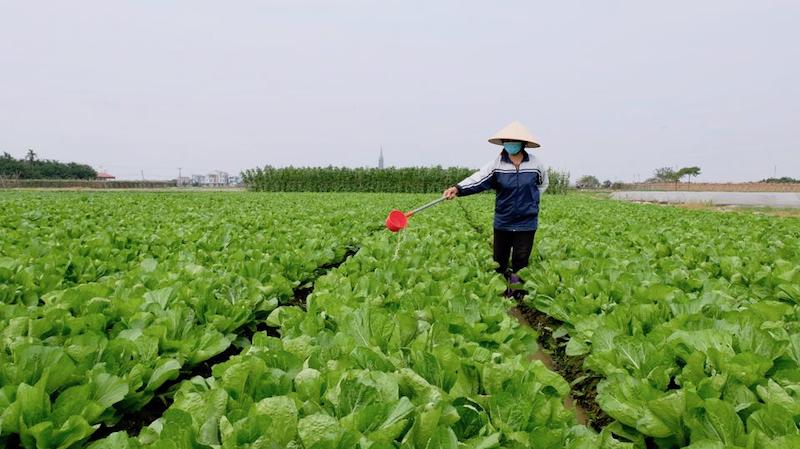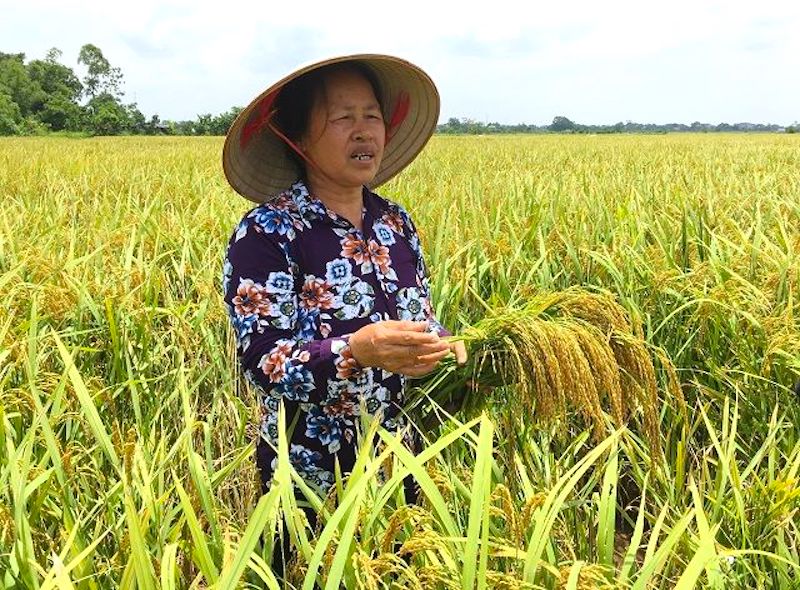Hanoi to expand hi-tech farming models
Hanoi plans to build a sustainable and modern agricultural sector, focusing on large-scale production with high productivity, quality, and competitiveness.
Hanoi is seeing an increase in the number of hi-tech farming and organic production farmers and cooperatives, gradually expanding the scale of green agricultural areas to contribute to the capital city's environmental protection.
| Safe farming model in Van Noi Commune, Dong Anh District. Photo: Lam Nguyen/The Hanoi Times |
The city has documented 285 high-tech agriculture models, compared to 160 in 2021. Among them, there are 185 crop cultivation models; the rest are livestock, fish farming, and mixed crop-livestock farming models.
According to the Hanoi Department of Agriculture and Rural Development, safe and organic farming models thrive in Soc Son, Dong Anh, Phu Xuyen, Thach That, Chuong My, My Duc, and Me Linh districts, contributing about 35% of the total farm production in the city.
In Chuong My District, the Dong Phu Organic Farming Cooperative has been managing 55ha of organic rice, in which farmers must strictly follow the regulations on safe production without pesticides.
"The hi-tech model has helped us gain contracts with big distributors to sell rice at prices 30% higher than other rice varieties," says Trinh Thi Nguyet, Director of the Dong Phu Organic Farming Cooperative. "The farm's products have been sold in domestic and international markets."
Organic production is safe for people's health while bringing about high economic value."
Meanwhile, Dong Anh District has set aside an area of more than 500 ha of vegetable production for concentrated, large-scale, and safe vegetable farming.
Deputy Chairman of Dong Anh District People's Committee Nguyen Anh Dung said the district had raised awareness among farmers to refrain from using pesticides to control the quality of safe vegetable products in concentrated production areas. As a result, pesticide use has sharply decreased, with many farmers using mainly organic and microbial fertilizers in agricultural production, Dung said.
Nguyen Cong Hoan, manager of Hoa Lac Ecological Potential Exploitation Co Ltd., owner of the Dai Ngan brand of organic vegetables, said consumers prefer her company's vegetables for their delicious taste, which sets them apart from those grown elsewhere. Dai Ngan vegetables are grown naturally, with fertilizers made from ginger, chili, garlic, and lemongrass.
The firm produces at least 3-4 tons of vegetables daily, earning between VND180 million (US$7,572) and VND240 million ($10,097).
"The price of organic vegetables is about 2.5 to three times higher than conventionally grown vegetables," said Hoan, who has nearly 20 years of experience in organic vegetables.
| A paddy field at Dong Phu Commune in Chuong My District. Photo: Tung Nguyen/The Hanoi Times |
Nguyen Manh Phuong, Deputy Director of the Hanoi Department of Agriculture and Rural Development, said that to expand green agricultural production areas, his agency, in collaboration with localities, provides farmers with farm safety and handling agrichemicals.
He said the Ministry of Agriculture and Rural Development and related bodies should soon map out mechanisms and policies to promote safer farming.
Permanent Deputy Chief of the Hanoi Coordination Office of New Rural Construction Program Nguyen Van Chi said that many hi-tech farming models, with investment in modern machinery and equipment, have initially brought about high economic efficiency. "The hi-tech application has helped farming households to increase quality and output, contribute to improving farmers' lives, and successfully implement the national program on building new-style rural areas in each locality," he said.
According to the city plan, Hanoi aims for 70% of all agricultural products from hi-tech farming models. Rural areas' average per capita income is expected to exceed VND80 million (US$3,226) a year. The proportion of trained workers will increase to more than 80% and that of rural workers with permanent jobs to 95% by 2030.
The sector authorities continue strengthening specific training programs to train local human resources and attract high-quality labor.
Especially, organic agricultural production will become the spearhead of the capital's agricultural sector, according to the Hanoi People's Committee.














